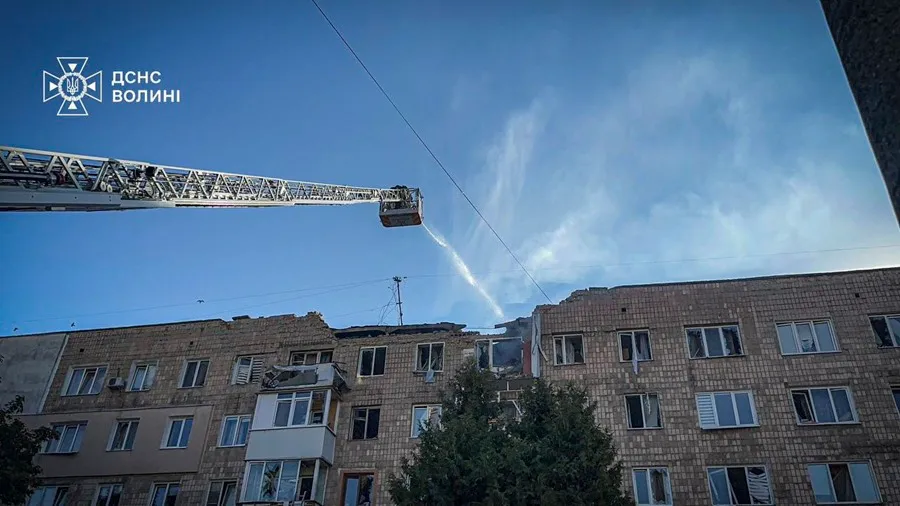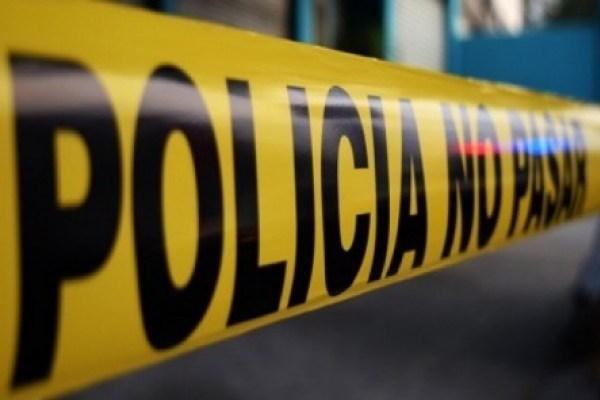International
The drone and missile attack launched by Russia has affected 15 of the 24 Ukrainian regions

The massive attack with drones and missiles launched by Russia during the early hours of Monday morning has affected 15 of the 24 Ukrainian regions, as reported by the Prime Minister of Ukraine, Denís Shmigal, on his Telegram account.
Shmigal explained that Russian forces have used drones, cruise missiles and Kinzhal hypersonic missiles in the attack. These last missiles are the most difficult to intercept in the entire Russian arsenal. Ukraine is vulnerable to the Kinzhal (which means ‘dagger’ in Russian) in most of its territory.
For his part, the Foreign Minister of Ukraine, Dmitro Kuleba, again asked Kiev’s Western partners to allow him to hit with his long-range weaponry military targets throughout the territory of the Russian Federation to avoid massive attacks with drones and missiles such as the one launched on Monday.
And the Russian Ministry of Defense confirmed that it had launched this attack against targets of the “energy infrastructure” of Ukraine.
“This morning, the Armed Forces of the Russian Federation launched a massive attack from the air and sea with high-precision and long-range weapons, and unmanned aerial vehicles against critical energy infrastructure facilities that guarantee the operation of the military-industrial complex of Ukraine,” says the military side.
In addition, according to the Russian command, “gas pumping stations in the Lviv, Ivano-Frankivsk and Kharkov regions, which guaranteed the operation of the Ukrainian gas transport system” and warehouses with aerial site pumps and projectiles “delivered by the West, at airfields in the Kiev and Dnipropetrovsk regions” were attacked.
Prime Minister Shmigal also recalled that there have been deaths and injuries in the attack. The authorities of the regions of Volín (northwest), Dnipropetrovsk (center), Zaporiyia (southeast) and Zhitómir (center-west) had previously reported the death of a total of four people.
Shmigal has also pointed out that “the target of the Russian terrorists was again the energy infrastructure.” “Unfortunately, there are damages in several regions,” said the head of government, who also reported power cuts in the country as a result of the impacts.
Ukrainian authorities have reported damage to electrical infrastructure in the regions of Lviv and (west) and Dnipropetrovsk. The massive Russian attack has also caused power and water cuts in some areas of Kiev, according to the mayor of the capital, Vitali Klichkó.
The Minister of Energy, Herman Galushchenko, has described the situation of the electricity system as “difficult” after the attack, and companies in the sector have announced emergency cuts due to the damage suffered by the system.
Today’s is the ninth Russian massive attack on the Ukrainian electricity system since last March 22. Ukraine has lost much of its generation capacity in these attacks, which forced the authorities to ration the supply with scheduled blackouts of up to half a day during the first part of the summer.
Meanwhile, the president of Ukraine, Volodymyr Zelensky, announced in his speech to the nation last night that the Ukrainian Army has taken control of two other localities in the Russian region of Kursk, where Kiev forces occupy dozens of towns after crossing the border in early August.
“I just spoke to the commander-in-chief (Oleksandr) Sirski. We are advancing in the Kursk region, from one to two kilometers. We have taken control of two more locations. There are operations underway in another town,” Zelenski said in his speech.
The head of the Ukrainian state also explained that his troops continue to take prisoners among Russian soldiers in the Kursk region. “We are filling in the ‘exchange fund,’” Zelenski said, referring to the exchanges of prisoners of war that are carried out regularly between both sides.
In addition, one journalist killed and three more injured left a Russian attack on the city of Kramatorsk, near the Donetsk front.
The deceased communicator was identified as Ryan Evans, a member of the Reuters team that covered the war in Ukraine, the British agency confirmed.
The attack also reached two other Reuters journalists of Ukrainian and American nationality, who were in a hotel in the east of Ukraine.
“Ryan Evans, a member of the Reuters team that covered the war in Ukraine, died and two Reuters journalists were injured in an attack on a hotel in the city of Kramatorsk,” the international news agency confirmed on Sunday.
According to other versions, a fourth Polish informant was injured when her vehicle was hit.
The Kremlin assured that Russian forces attack only military infrastructure or facilities linked to the Ukrainian military sector when commenting on the death of a security adviser from the Reuters agency in Kramatorsk.
Filashkin, the governor of Donetsk, recalled that throughout Saturday’s day seven civilians died in the region – which records the most intense fighting on the front at the moment – as a result of the Russian attacks, five of them in Kostiantinivka, while 15 people were injured.
International
Football Fan Killed in Clashes After Colombian League Match

Fans of Cúcuta Deportivo and their traditional rivals Atlético Bucaramanga clashed outside the stadium following their local league match on Tuesday, leaving one supporter dead and several others injured.
The deceased fan was stabbed, according to a senior police official in Cúcuta who confirmed the cause of death in a video statement. Local media reported that the victim was a supporter of the visiting team, Atlético Bucaramanga.
The match ended in a 2-2 draw. Authorities had banned the entry of Atlético Bucaramanga’s organized supporters into the stadium in an effort to prevent disturbances.
Despite the restrictions, violence broke out in the surrounding areas after the game. Among the injured were three police officers, an institutional source told AFP.
The incident adds to a series of recent violent episodes linked to Colombian football. The most recent occurred in December, when supporters of Atlético Nacional and Independiente Medellín clashed in the stands and on the pitch, leaving 59 people injured.
International
Missing Spanish Sailor Rescued After 11 Days Adrift in Mediterranean

The man had departed from the port of Gandía, on Spain’s eastern coast, with the intention of reaching the southern Spanish town of Guardamar del Segura, a journey of about 150 kilometers, a spokesperson for Spain’s maritime rescue service told AFP.
Search boats and aircraft were deployed on January 17, but the operation was called off on January 22 after efforts proved unsuccessful. Alerts were then issued to vessels navigating the area in case they spotted any signs of the missing sailor.
As hopes were fading, a surveillance aircraft from the European Union’s border agency Frontex spotted the sailboat on Tuesday, along with a person signaling for help, approximately 53 nautical miles northeast of Bejaia, Algeria.
A nearby vessel, the Singapore-flagged bulk carrier Thor Confidence, carried out the rescue and is expected to bring the man to an end to his ordeal when it arrives on Thursday in the southern Spanish port city of Algeciras.
Maritime rescue services shared images on social media showing a small white sailboat drifting at sea and secured alongside the much larger ship.
It remains unclear how the sailboat ended up hundreds of kilometers off its intended route or how the man managed to survive for so long alone in open waters.
International
Rubio Says U.S. Could Participate in Follow-Up Russia-Ukraine Talks

The United States could join a new round of talks this week aimed at ending Russia’s invasion of Ukraine, Secretary of State Marco Rubio said on Tuesday.
Teams from Kyiv and Moscow met last Friday and Saturday in Abu Dhabi in their first publicly acknowledged direct negotiations to discuss the peace initiative promoted by former U.S. President Donald Trump.
“They are going to hold follow-up talks again this week,” Rubio told the Senate Foreign Relations Committee. “There could be U.S. participation.”
However, Rubio suggested that Washington’s role may be more limited than during last week’s discussions, which included Steve Witkoff, the president’s special envoy, and Jared Kushner, Trump’s son-in-law.
The secretary of state indicated that progress may have already been made on security guarantees for Ukraine, one of Kyiv’s key demands in any agreement with Moscow after nearly four years of Russian invasion.
“There is one remaining issue that everyone is familiar with, and that is the territorial claim over Donetsk,” Rubio said, referring to the eastern Ukrainian region that Russia wants Ukraine to cede.
“I know that active efforts are underway to see whether the positions of both sides on this issue can be reconciled. It remains a bridge we have not yet crossed,” he added during the hearing.
Rubio acknowledged that the territorial question would be particularly difficult for Ukraine to resolve.
-

 Central America3 days ago
Central America3 days agoGuatemala seizes over a ton of cocaine hidden in flour at Pacific port
-

 International4 days ago
International4 days agoDelcy Rodríguez seeks political agreements after Maduro’s ouster
-

 International3 days ago
International3 days agoHistoric snowstorm paralyzes Toronto after 60 centimeters of snow
-

 International3 days ago
International3 days agoSpain’s irregular migrant population rises to 840,000, study finds
-

 International4 days ago
International4 days agoFederal immigration agents kill man in Minneapolis, sparking protests and outrage
-

 Central America2 days ago
Central America2 days agoGuatemala Police Arrest Prison Guard Caught in the Act of Extortion
-

 Central America2 days ago
Central America2 days agoHonduras swears in conservative president Asfura after disputed election
-

 Central America2 days ago
Central America2 days agoBukele leads public trust rankings as UCA survey highlights gains in security
-

 International16 hours ago
International16 hours agoFootball Fan Killed in Clashes After Colombian League Match
-

 International2 days ago
International2 days agoWinter Storm Fern Leaves 30 Dead and Over One Million Without Power Across the U.S.
-

 International2 days ago
International2 days agoDoomsday clock moves to 85 seconds before midnight amid rising global risks
-

 Sin categoría2 days ago
Sin categoría2 days agoEight Killed in Series of Armed Attacks in Ecuador’s Manabí Province
-

 International3 days ago
International3 days agoRights group says nearly 6,000 killed in Iran protest crackdown
-

 International2 days ago
International2 days agoSpain approves plan to regularize up to 500,000 migrants in Historic Shift
-

 International16 hours ago
International16 hours agoRubio Says U.S. Could Participate in Follow-Up Russia-Ukraine Talks
-

 International3 days ago
International3 days agoVenezuela frees at least 80 political prisoners, NGO says
-

 Sin categoría2 days ago
Sin categoría2 days agoEl Salvador Launches Fourth Year of Ocean Mission to Protect Marine Ecosystems
-

 International16 hours ago
International16 hours agoMissing Spanish Sailor Rescued After 11 Days Adrift in Mediterranean
-

 International3 days ago
International3 days agoEU launches new probe into X over AI-generated fake nude images
-

 Central America16 hours ago
Central America16 hours agoGuatemala President Says Starlink Terminal Found Inside Prison
-

 International3 days ago
International3 days agoFrance debates ban on social media for children under 15
-

 International3 days ago
International3 days agoSevere winter storm grips U.S., leaves multiple dead as extreme cold persists


























